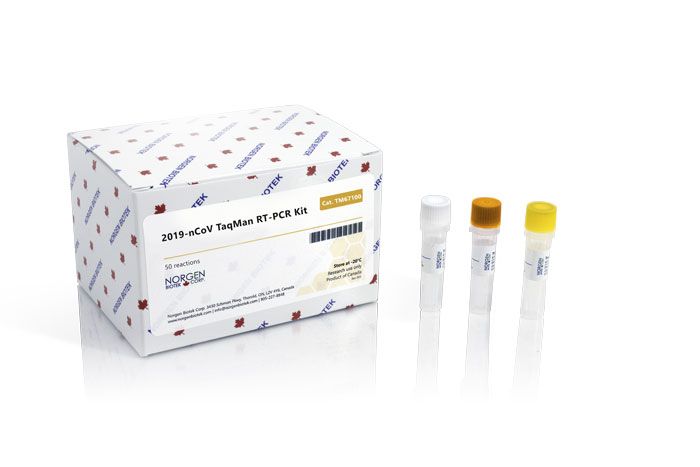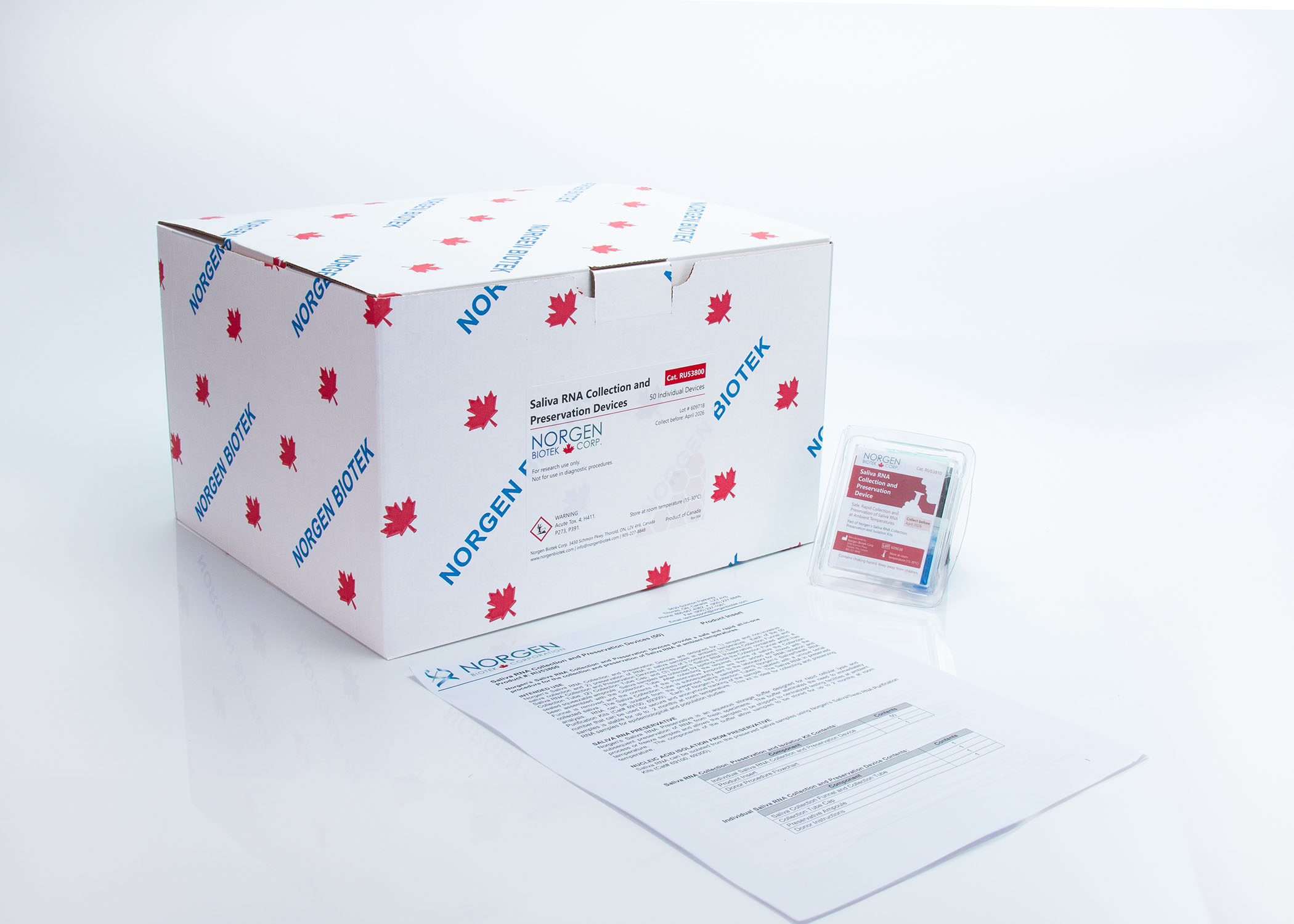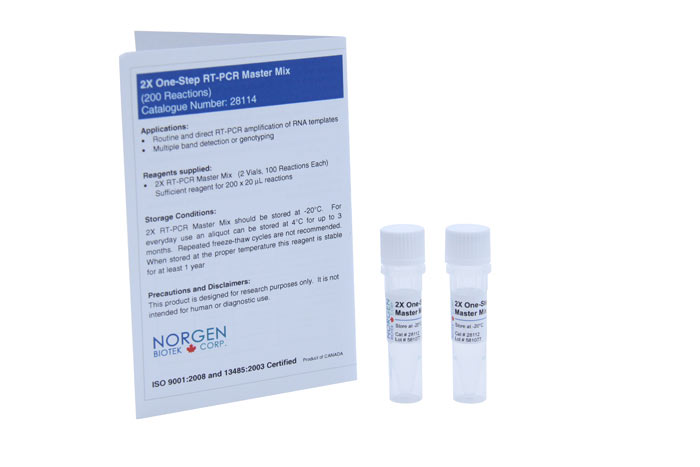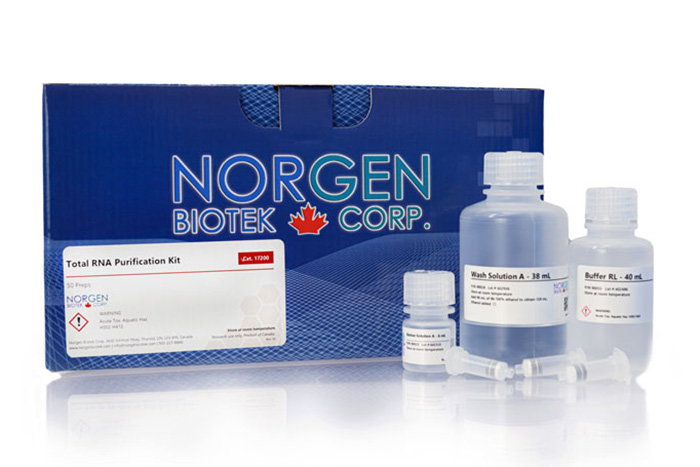2019-nCoV TaqMan RT-PCR Detection Kit Dx

Intended for in vitro diagnostics use.
2019-nCoV TaqMan RT-PCR Detection Kit Dx
Register today to receive an exclusive 15% off* on your first order.
Features and Benefits
- CE-IVD marked in accordance with EU Directive 98/79/EC
- Fits into in vitro diagnostic workflows
- COVID-19 detection based on the assays and protocols
developed by the CDC - Primer & Probe Mixes contain all 3 CDC developed assays in individual tubes
- All assays are premixed to the working concentrations
recommended by the CDC - Positive Control contains 2 nCoV nucleocapsid target gene RNA (N1,N2) and RNase P (internal control) which are compatible with the CDC primer/probe set
- Convenient ready-to-use 2X One-Step RT-PCR Master Mix
- Find out more information about our complete COVID-19 workflow
Norgen’s 2019-nCoV TaqMan RT-PCR Kit Dx provides SARS-CoV-2 detection based on the assays and protocols developed by the CDC. The kit utilizes RT-PCR for the amplification of specific target sequences and target specific probes for the detection of the amplified cDNA. The Primer & Probe Mixes contain all 3 CDC developed assays in individual tubes where probes are labelled with the fluorophore FAM. All assays are premixed to the working concentrations recommended by the CDC. The Positive Control contains two nCoV nucleocapsid target gene RNA (N1 and N2) and RNase P (internal control). The kit contains a positive control to monitor for PCR inhibition, and to validate the quality of the sample and the detection result. The 2019-nCoV TaqMan RT-PCR Kit Dx comprises Master Mix for the target and PCR control detection, 3 target Primer & Probe Mixes, as well as a positive control and a negative control (nuclease-free water) to confirm the integrity of the kit reagents.
Positive results are indicative of SARS-CoV-2 RNA detection, however clinical correlation with patient history and other diagnostic information is necessary to determine patient infection status. Positive results do not rule out co-infection with other viruses and therefore the agent detected may not be the definite cause of disease. Negative results do not preclude SARS-CoV-2 infection and should not be used as the sole basis for patient management decisions. Any negative results must be combined with clinical observations, patient history, and epidemiological information.
Norgen’s 2019-nCoV TaqMan RT-PCR Kit Dx is intended for use by professional users including clinical laboratory personnel experienced and trained in molecular biology techniques including real-time PCR and in vitro diagnostic procedures.
Norgen’s 2019-nCoV TaqMan RT-PCR Kit Dx was developed and validated to be used with the BioRad CFX96 Touch™ Real-Time PCR Detection System.
Background information
In December 2019, an outbreak of respiratory illness started in Wuhan City, Hubei Province, China and has now spread throughout the world to many different countries. This respiratory disease was caused by a novel coronavirus and was initially termed “2019 novel coronavirus” or “2019-nCoV”, however in February of 2020 the World Health Organization (WHO) announced that the official name of the disease is COVID-19. The official name of the coronavirus causing COVID-19 is SARS-CoV-2.
SARS-CoV-2 is a new strain of coronavirus infecting humans that had not been previously detected before the outbreak in China in December 2019. While SARS-CoV-2 is new, many coronaviruses have been known to infect animals and humans for some time. Coronaviruses are known to commonly infect camels, cattle, cats, and bats. In humans, Coronavirus infections can cause various illnesses from the common cold to more severe diseases such as Middle East Respiratory Syndrome (MERS) and Severe Acute Respiratory Syndrome (SARS).
Human infection is more severe when the coronavirus has originated in animals and spread to humans, as is the case with MERS and SARS. SARS-CoV-2 is a betacoronavirus, similar to MERS and SARS, both of which have their origins in bats. The animal source of SARS-CoV-2 has not yet been identified, however Chinese officials have linked many of the early cases to a large seafood and live animal market, suggesting that the initial transmission was the result of animal-to-person spread. However, many of the later detected cases did not report any exposure to animal markets, indicating that the virus is now spreading via human-to-human contact.
Symptoms of infection with SARS-CoV-2 can range from milder symptoms such as a runny nose, sore throat, cough, and fever to more severe symptoms including pneumonia or breathing difficulties. In some cases infection with SARS-CoV-2 has resulted in death. As with other respiratory illnesses, older people and individuals with pre-existing medical conditions (such as diabetes or heart disease) are more vulnerable to becoming severely ill with the virus.
Details
Supporting Data
Figure 1. Example of SARS-CoV-2 detection using Norgen's 2019-nCoV TaqMan RT-PCR Kit Dx (Cat. DxTM67100). One-Step RT PCR was prepared according to the manual provided with the kit. Five uL of Norgen's positive control (2x 10^6 theoretical copy number) was used for the 25 uL PCR reaction. Each target indicated by the name was successfully detected including the internal control (RP).
Table 1. Analytical sensitivity. The limit of detection of the 2019-nCoV TaqMan RT-PCR Kit Dx was determined using 20 contrived samples of each sample type. Contrived nasopharyngeal swabs (A), oropharyngeal swabs (B) and saliva samples (C) were generated by spiking 2019-nCoV RT-PCR Positive Control corresponding to 10 copies per PCR reaction. Confirmatory results were acceptable at a 95% confidence interval. This can be achieved when obtaining a minimum of 19 positive samples out of the 20 samples spiked at the limit of detection. As seen in Table 1, the limit of detection of Norgens 2019-nCoV TaqMan RT-PCR Kit Dx from RNA isolated from nasopharyngeal swabs, oropharyngeal swabs and saliva samples was confirmed to be 10 copies per PCR reaction at a 95% confidence interval.
Table 2: Specificity analysis To test the analytical specificity of Norgens 2019-nCoV TaqMan RT-PCR Kit Dx, the 2019-nCoV RT-PCR Positive Control Dx (containing the two nCoV nucleocapsid target gene RNA (N1 and N2) and RNase P) was used to test the kits specificity against RNA purified from other related pathogens. As can be seen in the table only Norgens 2019-nCoV RT-PCR Positive Control showed amplification for all genes. Therefore, Norgens 2019-nCoV TaqMan RT-PCR Kit Dx can be used to specifically detect, confirm and discriminate COVID-19.
Table 3: Diagnostic Accuracy. Clinical evaluation of the accuracy of the 2019-nCoV TaqMan RT-PCR Kit Dx was conducted with contrived nasopharyngeal swabs, oropharyngeal swabs and saliva samples by testing 30 positive and 30 negative samples to generate the Positive Percentage Agreement (PPA), Negative Percentage Agreement (NPA) and overall percentage agreement (OPA) as a measurement of estimated Diagnostic Accuracy. For the 30 contrived positive samples, each were spiked with 5 µL of different concentrations of the 2019-nCoV RT-PCR Positive Control to generate input 15 samples of variable transcript content that corresponds to a limit of detection (LoD) range from 1X to 1,000X (10 samples at 1X, 10 samples at 2X, 4 samples at 10X, 3 samples at 100X and 3 samples at 1,000X). The remaining 30 samples from each sample type were not spiked (nonreactive). RNA isolation was performed from all samples using Norgen’s Saliva/Swab RNA Purification Kit (Cat. #69100) and RNA was eluted in 50 µL. Five microliters of the isolated RNA were used as a template in the Norgen’s 2019-nCoV TaqMan RT-PCR Kit Dx to detect the 3 targets of the kits (N1, N2 and RP). The various SARS-CoV-2 kit targets can be detected from RNA isolated from contrived nasopharyngeal swabs, oropharyngeal swabs and saliva samples, at various detection limits using Norgen’s 2019-nCoV TaqMan RT-PCR Kit Dx with no detectable viral targets from non-reactive samples.
Table 4. Interpretation of Assay Results. The Negative Control (NTC No Template Control) reaction(s) must be negative and not exhibit fluorescence growth curves that cross the threshold line. If there is any amplification with the NTC the run is not valid and no interpretation of 2019-nCoV detection can be made. In this case the assay must be repeated. The Positive Control (PosC) reaction(s) should produce a positive result with an expected Ct value below 20 for each target. If the positive control does not provide a positive result the run is not valid and no interpretation of 2019-nCoV detection can be made and the assay must be repeated. If the NTC and PosC are exhibiting the correct results, the results of the detection assays can be interpreted as outlined in the product manual.
Storage Conditions and Product Stability
- The 2019-nCoV TaqMan RT-PCR Kit Dx is shipped on dry ice. The components of the kit should be frozen upon arrival. If one or more of the components is not frozen when the kit is received, or if any of the components have been compromised during shipment, do not use the kit and contact Norgen Biotek for assistance.
- All kit components should be stored at -20°C upon arrival.
- Repeated thawing and freezing (>3X) of the Master Mix and Positive Control should be avoided, as this may affect the performance of the assay. If the reagents are to be used only intermittently, they should be frozen in aliquots.
- All reagents can be used until the expiration date specified on their labels.
| Component | Cat. DxTM67100 (50 rxns) | Cat. DxTM67120 (500 rxns) |
|---|---|---|
| 2019-nCoV_N1 Probe/Primer Mix Dx | 80 μL | 850 μL |
| 2019-nCoV_N2 Probe/Primer Mix Dx | 80 μL | 850 μL |
| RNAse P Probe/Primer Mix Dx | 80 μL | 850 μL |
| 2019-nCoV RT-PCR Positive Control Dx - 200,000 copies/μL | 50 μL | 500 μL |
| 2X One-Step RT-PCR Master Mix Dx | 2 x 1 mL | 20 x 1 mL |
| Nuclease-Free Water (Negative control) | 1.25 mL | 10 x 1.25 mL |
| Product Insert | 1 | 1 |
Documentation
Citations
| Title | Denaturing and dNTPs reagents improve SARS-CoV-2 detection via single and multiplex RT-qPCR [version 1; peer review: 1 approved with reservations] |
| Journal | F1000 Research. 2022. |
| Authors | Cristian E. Cadena-Caballero, Lina M. Vera-Cala, Carlos Barrios-Hernandez, Diego Rueda-Plata, Lizeth J. Forero-Buitrago, Carolina S. Torres-Jimenez, Erika Lizarazo-Gutierrez, Mayra Agudelo-Rodriguez, Francisco Martinez-Perez |



